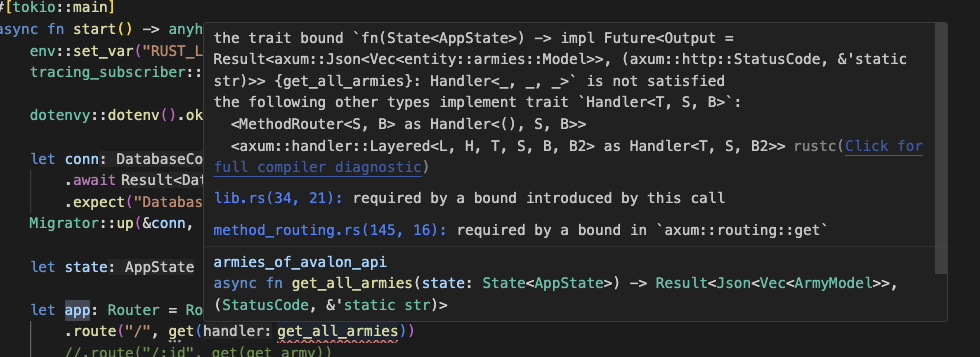Indeed it does haha, thanks
nerdblood
I'm new to multithreaded programming. How would some other thread create it? Like what's the real-world scenario?
I think I had that in a few attempts, I can't remember why I removed it. Thanks for pointing this out.
I managed to get this working, but there has to be a better way. How else could I write this?
pub async fn insert_or_return_user(
db: &DbConn,
partial_user: Auth0UserPart,
) -> Result {
let user = users::ActiveModel {
email: Set(partial_user.email.to_owned()),
email_verified: Set(partial_user.email_verified.to_owned()),
auth0_sub: Set(partial_user.sub.to_owned()),
..Default::default()
};
let result = user.clone().insert(db).await;
match result {
Ok(u) => {
println!("{u:#?}");
Ok(u.try_into_model().unwrap() as UsersModel)
}
Err(error) => {
let user = Users::find()
.filter(users::Column::Auth0Sub.eq(&partial_user.sub))
.one(db)
.await?;
Ok(user.unwrap() as UsersModel)
}
}
}
🤣
We're a pretty darn good minor league baseball team if you ask me
It should be wrapped in an array, not an object. Then it's valid. The problem was that I was trying to use an enum.
Yes, that's what I meant, but no I can't edit it :/
I got the response wrong, here's what I'm using that isn't working:
enum NationResponse {
Nation(Nation),
People(Vec),
}
Why the heck can't I edit the original post after a comment is made?
Thanks for the reply! I don't know what you mean by extensions, but the state is literally just the DB connection:
struct AppState { conn: DatabaseConnection, }
Async I have a handle on, but I'll take a look at the others for sure.
🤔 I thought lazy_static was deprecated in favor of one_cell

Sqlbolt has been good so far, just started myself